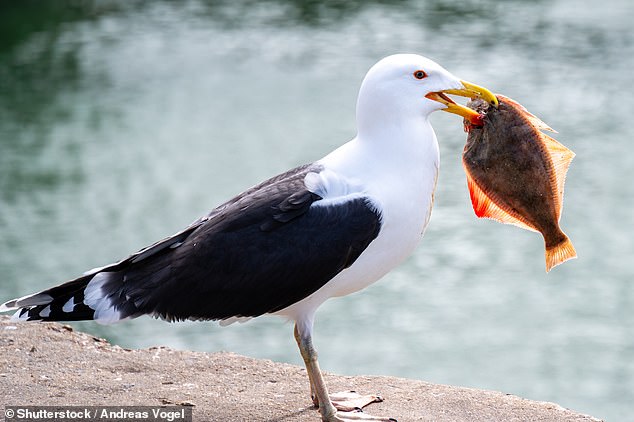Anyone with common sense knows that it is a good idea to protect food when we are at the beach.
But while seagulls may steal your fries (or even your ice cream), they actually prefer seafood, according to a study.
Researchers have found that seagull chicks raised on an “urban” diet will still prefer fish to human snacks.
The team, from the University of Exeter, studied herring gull chicks that had been rescued after falling from rooftops in towns across Cornwall.
While being raised in captivity, before being released, they were given either a “marine” diet consisting primarily of fish and mussels, or an “urban” diet containing primarily bread and cat food.
Anyone with common sense knows that it’s a good idea to protect your food when you’re at the beach. But while seagulls may steal your chips (or even your ice cream), they actually prefer seafood, according to a study.
Every few days, the gull chicks were presented with a selection of the four foods in different bowls, to test which they preferred (and all the gulls clearly preferred the fish).
“Our results suggest that even when raised on an ‘urban’ diet of foods only found near people, these chicks are unlikely to seek out urban foods as adults,” said lead author Emma Inzani.
‘The foods humans eat are usually reliably present and easy to obtain, but when fish are available, they clearly prefer it.’
Herring gulls are often a pest in urban areas, where they scavenge through food scraps and garbage bins, and sometimes steal food from people.
However, the species is on the UK’s List of Most Concern for Conservation due to its continuing population decline.
Ms Inzani said a combination of reduced fish stocks in UK waters, coupled with abundant and easy access to food waste in cities, may mean it is not as profitable for gulls to expend a lot of energy going out to sea to forage.

Researchers have found that seagull chicks raised on an “urban” diet will still choose fish over human snacks.
Previous research has shown that parent gulls often switch to foraging for more shellfish once their chicks hatch, possibly because shellfish provide more of the nutrients the chicks need to grow.
In the study, published in the journal PeerJ, the 27 chicks had access to food throughout the day.
However, half of the chicks were fed urban food for 80 percent of the day and seafood for 20 percent, while the other half were fed the opposite diet.
When presented with the four foods together on days five, ten, fifteen, and thirty-five of the study, both groups consistently favored the fish, and even those who tried the bread rarely ate much of it.
The chicks’ preferences for fish found in this study may reinforce the observed behavior in parent gulls of switching to a greater supply of marine-based food after chicks hatch, the researchers said.
“Animals can live in and exploit urban areas to obtain human food waste,” said lead author Dr Neeltje Boogert.
‘However, this does not necessarily mean that they are thriving or that they prefer this food over making the best of a bad situation.
‘Further research is needed to investigate how the food young animals receive affects their later life, including their dietary choices, health and parenting.’

